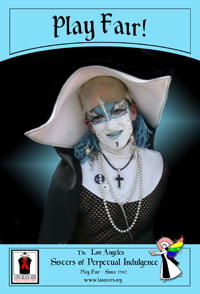The Sisters of Perpetual Indulgence, an unconventional order of nuns, have been educating the public about safer sex since the first days of the AIDS epidemic. But Sister Tragedy Ann, of the Los Angeles group, believes that traditional messages—like, “Wear a rubber!”—have gone to the wayside.
She’s witnessed firsthand their ineffectiveness. While ministering to partiers at bars and clubs in recent years, Tragedy Ann—who, like many of the sisters, is a man in outrageous nun drag—would hand out condoms. Patrons would gladly take the prophylactics, only to later discard them, unopened, on the ground. It was proof, she decided, that a new strategy was needed. Tragedy Ann rejuvenated her sisters’ safe-sex outreach efforts by launching a series of Play Fair! trading cards. They debuted this May during Gay Pride, and the first set of cards has become a hot, summertime hit.
 |
| A Play Fair! card featuring Sister Tragedy Ann. |
And what tales they are. They’re explicit, frank and at times visceral and unexpected (Sister Perkie Dot recounts in a lesbian couple’s exposure to a vaginal bacteria and possibly HIV.)
“Our approach is ‘Tell us your real-life stories. Let’s talk about the reality of what we’re dealing with every day,’” Sister Tragedy Ann says. “I believe that sharing the direct and blunt stories of emotions and feelings is a way to reach people.” She credits Long Beach AIDS Foundation’s executive director Garry Bowie with grasping the allure of the sister’s unorthodox imagery and larger-than-life personalities and then harnessing them for a most unusual educational effort, on that she thinks will resonate with readers and influence the decisions they make in the heat of the moment.
The sisters hand out the cards whenever they’re out on the town. Play Fair! cards are also available at gay centers and various organizations. To bring revenue to the Long Beach AIDS Foundation, sisters are also turning the cards into a series of magnets—called “fagnets”—which they will soon sell in person and online.
Their target audience is 18- to 24-year-olds, a demographic that Sister Tragedy Ann says HIV has hit particularly hard in the Long Beach area. (She also notes that the sisters created a generic card to hand out to younger audiences and families.)
Three complete cards are posted online so far, but nearly 24 new cards are ready to go. The idea, Tragedy Ann says, is to filter them out over a couple of years and to have readers collect the sets, which the sisters refer to as “bubble cum cards.”
“I’m particularly excited about some of the upcoming stories that are about [HIV-positive] individuals who went down a destructive path and got to a point where they basically said, ‘Holy shit, I’m going to live,’” Tragedy Ann says. “They tell a different side of the story.”
Who Are the Sisters?
The Sisters of Perpetual Indulgence Inc. has been spreading the gospel of safe sex and tending to the HIV/AIDS community for three decades. The group began in 1979 when three free-spirited men wearing nun habits hit the streets of San Francisco to challenge conformity and homophobia. Today, The Sisters of Perpetual Indulgence has grown into an order of about 600 members, some whom are living with HIV, in nearly 20 orders worldwide.
“We’re not drag queens, we’re not all men, and we’re not all gay,” clarifies Sister Edith Myflesh of the San Francisco order. “We consider ourselves nuns, and part of our job is taking care of people who traditional religion passes on.”
When the epidemic first hit, the sisters made AIDS a major focus. They’re responsible for one of the first AIDS candlelight vigils and safe-sex pamphlets, titled Play Fair! Back in 1982, nobody wanted to hear about condoms, recalls founder Sister Hysterectoria. “Instead of men saying [to play safe] it was nuns, and that made it more palpable.”
Although theatrics and partying remain part of their mantra, the sisters still make AIDS activism a priority. They have raised funds for countless AIDS service organizations and events, ranging from Catherine’s House, a retreat in the Bay area for those living with the virus, to the Bill Holt Pediatric HIV Clinic in Phoenix. They produce their own events, plug into others and add flair to corporate events. They deliver food and sweets such as strawberries and chocolate to AIDS hospices, march in demonstrations, teach safer-sex seminars and raise funds for numerous AIDS services—last year, the San Fran order raised more than $200,000.
“Sisters provide support in any way we can,” says Sister Ora Lee Wunderbar of the Grand Canyon order. “Sisters can be at the front of a protest line, shouting for equal treatment of those suffering from HIV/AIDS. A sister can be on stage calling for donations to help a struggling support agency meet their clients’ needs. A sister can be standing in silence, holding a candle to remember one who was lost to a hate crime simply for being HIV positive.”
The order’s outreach often depends on the needs of each community. In countries with socialized medicine, according to Sister Innocenta of Paris, the order’s main focus turns from fundraising to education and ministry—which often entails simply listening to a lonely patron at a bar.
In fact, this one-on-one outreach at the nightclubs and in the streets—called “a ministry of presence”—is a sisters hallmark. “The basis of our ministry is acknowledging another human being and saying, ‘You’re a person, and I recognize you as a person, and you have value and worth, and I’m willing to spend 10 minutes with you,’” Sister Edith explains.
“There have been several nights out in the bars,” recounts Sister Atopa Slepurr-Sofa of the Grand Canyon order, “that I have had individuals break down and tell me how they contracted the virus, or how scared they are about getting it.”
Because they’re on the fringe, notes Sister Unity Divine of Los Angeles, they’re able to service constituents overlooked by mainstream agencies. The freak factor underscores a message: “If we’re here looking as we look,” she says, “there’s room for you to be who you are with no shame or fear.” Amen to that!






3 Comments
3 Comments